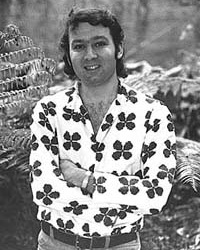
Winston Leyland
Biography
Winston Leyland, prominent gay writer, editor and publisher, was born in 1940 in Lancashire in northern England. His father served in the British army in India during World War II. One of Winston’s earliest memories is of putting on a gas mask and descending into the shelter dug in their garden to protect against possible German attack. Winston was a sensitive, introspective and studious child who attended Catholic elementary school.
In 1952 the Leyland family moved to Providence, Rhode Island, in the U.S. Winston graduated from high school and studied two years at college before enrolling in the seminary of the Society of St. Columban in Milton, Massachusetts. During his eight years there, he read voraciously on a wide variety of subjects. On December 21, 1966 he was ordained into the priesthood.
Following his ordination Winston was sent to study—and earned a master’s degree in medieval history—at UCLA. Over this period of his life, Leyland developed a strong affinity with prophetic strains within Catholicism and the “underground church movement.” He was influenced by the writings and actions of the Berrigan brothers and by Thomas Merton. Homilies he offered during Mass spoke of the immorality of the American war in Vietnam and proposed Gandhian-style resistance. This drew the ire of the very conservative Cardinal McIntyre in the Los Angeles Diocese who pressured Leyland’s order to have him removed. His order threatened to send him to Omaha, Nebraska for a period of rest. For Winston this was the moment of decision: to live a life of hypocrisy in the church, or to live a life of truth. This was many years before church sexual scandals and Winston was not involved in any, then, or later. He decided to leave his order in 1968 to come out and follow his conscience in his political and social activities.
In early 1969 Leyland was living in Hollywood and working as a proofreader for the Los Angeles Times. He found himself drawn to northern California and so moved to Berkeley in the fall of 1970. The explosion of the gay liberation movement in the U.S. at this time included the emergence of a number of journalistic and literary ventures. Winston got involved with the newly formed tabloid Gay Sunshine, which first published in August 1970.
Gay Sunshine was published by a Berkeley collective and presented local and national news of gay liberation activities. In early 1971, the collective disbanded and publication was suspended. Leyland personally took responsibility for resuming publication with the spring 1971 issue. Although the masthead still said “Gay Sunshine Collective” Leyland carried out almost all of the work of publishing himself. While the paper still covered gay liberation activities, Leyland began adding more gay literary content. This led to the redesign of the publication into the Gay Sunshine Journal in San Francisco in 1973 in order to provide a creative outlet for emerging gay literary and artistic expressions. During its run into 1982 Gay Sunshine Journal was unprecedented in its myriad presentations of gay history, sex, politics and culture. As Charles Kirtley wrote in Lesbian and Gay New York: “Essays, fiction, poetry, graphics, and interviews with such figures as William Burroughs, Jean Genet, Allen Ginsberg, Christopher Isherwood, Gore Vidal and Tennessee Williams were grist for Mr. Leyland's literary mill. In Leyland's hands, these contributions provided a flavorful ambrosia for gay readers starved for images of themselves.”
In 1975 Leyland decided to publish material in a more permanent book format and founded Gay Sunshine Press in San Francisco as a non-profit corporation in which he served as editor-in-chief. He received several grants from the National Endowment for the Arts. Gay Sunshine Press is oldest continuously publishing book house of varied gay material in the U.S.
Between Gay Sunshine Press and Leyland Publications, which began in 1984 to publish gay erotica and popular culture, Leyland has more than 135 books to his credit. One of Leyland's greatest contributions to gay literature has been in publishing writers and translations from other cultures, including Latin America (Argentina, Mexico, Cuba and Brazil), Japan and Russia.
A common thread running through many of Leyland’s books is that of erotic spirituality. Again as Kirtley noted in his review of Leyland: “Any love worthy of its name is deeply spiritual. It is when we dichotomize the physical and the spiritual that we are in trouble. That is a lesson well-known by Winston Leyland.”
In the early 1990s Leyland became a practicing Vajrayana (Nyingma) Buddhist. He published Queer Dharma: Voices of Gay Buddhists (1998)—with a second volume in 2000—that breaks new ground with essays, personal accounts, fiction and poetry about gay sexuality and spiritual life within a Buddhist framework. In 1999 he also published Openly Gay, Openly Christian: A Gay-Friendly Guide to Scripture by the Rev. Samuel Kader.
(This biographical statement written by Mark Bowman from Winston Leyland’s self-interview in the Introduction to Gay Roots: Twenty Years of Gay Sunshine, 1991, and an article by Charles Kirtley in Lesbian & Gay New York Spring 1998—with revisions by Winston Leyland. Photo of Winston Leyland in San Francisco in 1976 by Steve Lafer.)
Biography Date: January, 2014
Additional Resources
Tags
Gay Spirituality | Author/editor | California | Buddhist | Catholic (Roman) | Leyland, Winston
Citation
“Winston Leyland | Profile”, LGBTQ Religious Archives Network, accessed April 16, 2024, https://lgbtqreligiousarchives.org/profiles/winston-leyland.
Remembrances